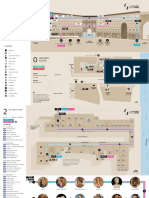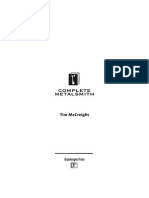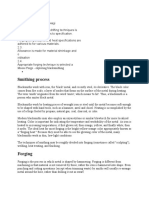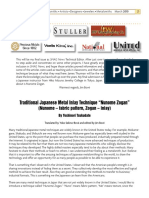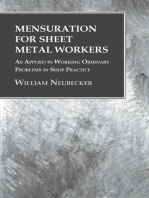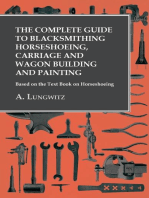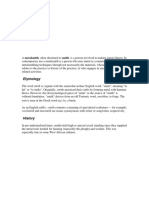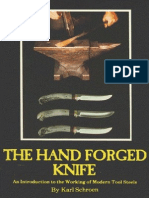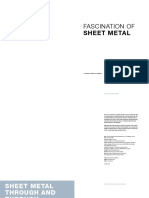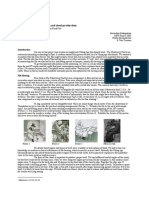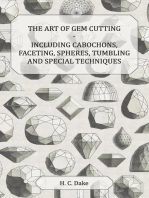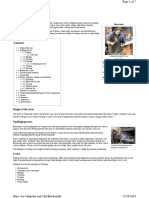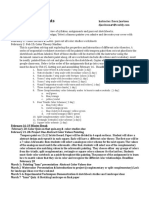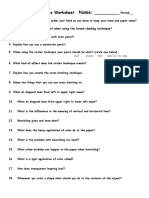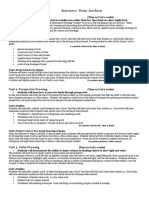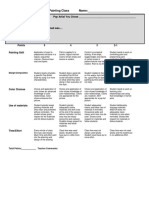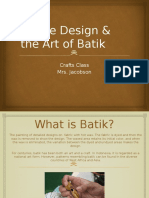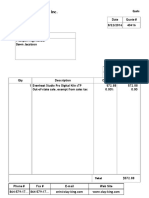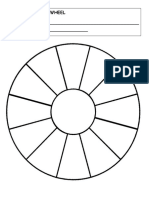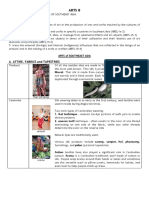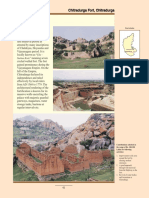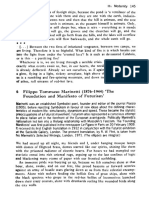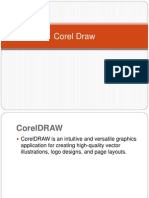0 ratings0% found this document useful (0 votes)
1K viewsMetalembossing
Metalembossing
Uploaded by
api-293964578Copyright:
© All Rights Reserved
Available Formats
Download as PPT, PDF, TXT or read online from Scribd
Metalembossing
Metalembossing
Uploaded by
api-2939645780 ratings0% found this document useful (0 votes)
1K views18 pagesOriginal Title
metalembossing
Copyright
© © All Rights Reserved
Available Formats
PPT, PDF, TXT or read online from Scribd
Share this document
Did you find this document useful?
Is this content inappropriate?
Copyright:
© All Rights Reserved
Available Formats
Download as PPT, PDF, TXT or read online from Scribd
Download as ppt, pdf, or txt
0 ratings0% found this document useful (0 votes)
1K views18 pagesMetalembossing
Metalembossing
Uploaded by
api-293964578Copyright:
© All Rights Reserved
Available Formats
Download as PPT, PDF, TXT or read online from Scribd
Download as ppt, pdf, or txt
You are on page 1of 18
.
Metalworking is a science, art, hobby, industry and
trade. Its historical roots span cultures, civilizations,
and millennia. Metalworking has evolved from the
discovery of smelting various ores, producing
malleable and ductile metal useful for tools and
adornments.
Funeral Mask of King Tutankhamen, Egyptian, 1324 BC.
When you emboss metal, you
participate in an art form that
has existed for centuries. Metal
embossing is used to impart a
design upon metal sheets. The
metal is pushed with an
embossing tool or stylus in
order to create a raised effect
on the opposite side. By placing
the metal sheet on a rubber or
foam pad, the positive
impression has a smooth
surface that will shine or can
take pigment.
The metal embossing
began in Iran Persian
(approximately 550 to
330 BC). The popularity
of the craft spread
around the globe and
through the ages.
It was especially popular
during the Middle Ages
(A.D. 400-about 1400)
otherwise know as
Medieval Period, when
metal-smiths hammered
designs into suits of
armor.
Agememnons Funeral Mask Gold Mycenean Cup
Repouss is a method metalworking. It is like
embossing however a little more aggressive. With
Repousse the technique takes a sheet of metal
and uses a hammering method from the reverse
side to create a design in low relief design.
Repouss
In French repouss
means
pushed out.
Gary Dadyan, a Russian artist, is tapping
the repouss tools into the sheet of metal
using a small hammer.
The best known
example of repouss is
the Statue of Liberty
by Frederic Auguste
Barthodi
The craft was The apprentice would
taught to young work with the artisan
apprentices in a and learn how to
guild. correctly work with the
metal.
Their apprenticeship
would last for many
years till they earned
their reputation for their
great skill.
A person whom works
with metal is called a
metal smith.
A metalsmith or
simply smith is a
craftsman fashioning
useful items (for
example, tools,
kitchenware, jewelry,
weapons, out of
various metals.
Smithing is one of the
oldest metal working
occupations.
What we
want to see
in good
metal work
is clear
patterns,
crisp
images and
lines.
Notice this close up of the
project. Examine the delicate
lettering and how its been
pressed out.
STEP ONE: The Design of Your Plate
1. Sheet of 9x 18 newsprint paper, fold into 2
sections.
2. Trace the size plate you want to make.
3. Design two different ideas that have a famous
quote either on the middle or around the
boarder.
4. Letters need to be large. Small letters do not
emboss well and look bad.
5. Meet with instructor & select the best design.
6. Trace design on to tracing paper backwards
using the light tracer.
STEP TWO :Preparing the Metal
1.Trace plate on metal
2.Make it inch bigger- because the edge need
to later be wrapped around the plate.
3.Carefully cut out the circle
4.Rub steel wool over the edge to remove sharp
edges.
5.Tape tracing paper over the metal so the words
are backwards/reversed.
6.Use an ink pen to lightly trace over the design and
remove tracing paper.
STEP THREE: EMBOSSING
1. Place a rubber mat under your
metal.
2. Use the 10 seconds tools or stylus
tool to emboss areas down.
3. Always work on both sides of the
metal.
4. Press on one side- then flip over
and refine...repeat
5. If you dont work both sides- letter
that you embossed with not stand
out.
STEP FOUR :ANTIQUING & Final Presentation
1. Apply a coat of Liver of Sulfur to
age the metal.
2. Let dry
3. Use 000 grade steel wool to buff
the copper to a desire patina.
4. Tape metal to paper plate
5. Cut inch tabs and fold over edge
of plate.
6. Use hammer to bend edges
round so the are round not
octagon/pointed edges.
7. Use white glue and glue paper
plate on to brown paper, (centered)
then glue brown paper on to larger
black paper.
You might also like
- Easy Project Pinch Pot Power PointDocument16 pagesEasy Project Pinch Pot Power Pointapi-293964578100% (2)
- High School Clayforweeblypart2Document62 pagesHigh School Clayforweeblypart2api-293964578100% (1)
- Printmaking Powerpoint 2015shortDocument44 pagesPrintmaking Powerpoint 2015shortapi-29396457883% (6)
- High School Clay For WeeblyDocument71 pagesHigh School Clay For Weeblyapi-293964578100% (6)
- Brochure Uffizi WEB ENGLISH-Pubblicazione-3.12Document3 pagesBrochure Uffizi WEB ENGLISH-Pubblicazione-3.12Anonymous PYgnwOWKNo ratings yet
- Forging of Iron and Steel - A Text Book for the Use of Students in Colleges, Secondary Schools and the ShopFrom EverandForging of Iron and Steel - A Text Book for the Use of Students in Colleges, Secondary Schools and the ShopNo ratings yet
- Complete Metalsmith StudentDocument21 pagesComplete Metalsmith StudentJoyasLoni100% (9)
- Drawing AssignmentsinstructorDocument2 pagesDrawing Assignmentsinstructorapi-293964578No ratings yet
- Perspective For 2d ArtDocument48 pagesPerspective For 2d Artapi-293964578100% (2)
- Ceramics AssigmentsDocument1 pageCeramics Assigmentsapi-293964578No ratings yet
- Module - IntroductioninMetalWorkDocument19 pagesModule - IntroductioninMetalWorkDaniel Daryl CalingNo ratings yet
- First Lessons in Metal WorkingDocument192 pagesFirst Lessons in Metal WorkingDonT_RN100% (3)
- EndexDocument25 pagesEndexbelacheweshetu222No ratings yet
- Old Process New Technology Modern Mokume GaneDocument13 pagesOld Process New Technology Modern Mokume GaneTomáš NěmečekNo ratings yet
- Repoussé Handout 2019Document15 pagesRepoussé Handout 2019Shawn EvansNo ratings yet
- Practical Blacksmithing - A Collection of Articles Contributed at Different Times by Skilled Workmen to the Columns of "The Blacksmith and Wheelwright": Covering Nearly the Whole Range of Blacksmithing from the Simplest Job of Work to Some of the Most Complex Forgings - Volume IV.From EverandPractical Blacksmithing - A Collection of Articles Contributed at Different Times by Skilled Workmen to the Columns of "The Blacksmith and Wheelwright": Covering Nearly the Whole Range of Blacksmithing from the Simplest Job of Work to Some of the Most Complex Forgings - Volume IV.No ratings yet
- Numone ZoganDocument5 pagesNumone Zoganarc4ngelNo ratings yet
- Repousse Frames: Treasures of Ancient America, S. K. Lothrop - Art of The Incas, Henri StierlinDocument4 pagesRepousse Frames: Treasures of Ancient America, S. K. Lothrop - Art of The Incas, Henri Stierlinapi-101128899No ratings yet
- Jewelry Making for Beginners: 32 Projects with MetalsFrom EverandJewelry Making for Beginners: 32 Projects with MetalsRating: 4 out of 5 stars4/5 (2)
- Practical Blacksmithing - A Collection of Articles Contributed at Different Times by Skilled Workmen to the Columns of "The Blacksmith and Wheelwright": Covering Nearly the Whole Range of Blacksmithing from the Simplest Job of Work to Some of the Most Complex Forgings - Volume IIIFrom EverandPractical Blacksmithing - A Collection of Articles Contributed at Different Times by Skilled Workmen to the Columns of "The Blacksmith and Wheelwright": Covering Nearly the Whole Range of Blacksmithing from the Simplest Job of Work to Some of the Most Complex Forgings - Volume IIINo ratings yet
- 3 Metal Clay ProjectsDocument15 pages3 Metal Clay Projectsbeadysam100% (1)
- Mensuration for Sheet Metal Workers - As Applied in Working Ordinary Problems in Shop PracticeFrom EverandMensuration for Sheet Metal Workers - As Applied in Working Ordinary Problems in Shop PracticeNo ratings yet
- Silverpoint DrawingDocument3 pagesSilverpoint DrawingAuk van HiltenNo ratings yet
- CopperbandringDocument2 pagesCopperbandringapi-250295080No ratings yet
- The Home Blacksmith: Tools, Techniques, and 40 Practical Projects for the Blacksmith HobbyistFrom EverandThe Home Blacksmith: Tools, Techniques, and 40 Practical Projects for the Blacksmith HobbyistRating: 4 out of 5 stars4/5 (1)
- Others: Ivory, Kirikane (Cut Gold), Cloisonne, Glass, Gemstones, Ink StonesDocument16 pagesOthers: Ivory, Kirikane (Cut Gold), Cloisonne, Glass, Gemstones, Ink StonesGuadalupeCaravajalNo ratings yet
- Metal Clay - The Complete Guide: Innovative Techniques to Inspire Any ArtistFrom EverandMetal Clay - The Complete Guide: Innovative Techniques to Inspire Any ArtistRating: 4 out of 5 stars4/5 (3)
- Blacksmithing For Beginners - Everything You Need To Know ToDocument35 pagesBlacksmithing For Beginners - Everything You Need To Know ToFREEDOM Saliendo De La Caverna100% (2)
- Metal Jewelry Workshop: Essential Tools, Easy-to-Learn Techniques, and 12 Projects for the Beginning Jewelry ArtistFrom EverandMetal Jewelry Workshop: Essential Tools, Easy-to-Learn Techniques, and 12 Projects for the Beginning Jewelry ArtistNo ratings yet
- Copper Work: A Text Book for Teachers and Students in the Manual ArtsFrom EverandCopper Work: A Text Book for Teachers and Students in the Manual ArtsNo ratings yet
- 1 Toth Opt SecDocument12 pages1 Toth Opt SeccoolerthanhumphreyNo ratings yet
- Mad About Metal: More Than 50 Embossed Craft Projects for Your HomeFrom EverandMad About Metal: More Than 50 Embossed Craft Projects for Your HomeNo ratings yet
- Know All About Jewelry Maki NG Jewelry Desi Gni NG and Metal Worki NG PDFDocument116 pagesKnow All About Jewelry Maki NG Jewelry Desi Gni NG and Metal Worki NG PDFhung garul100% (5)
- Steel Fabrication Sample EdiDocument0 pagesSteel Fabrication Sample EdiKeerthi KumarNo ratings yet
- The Complete Guide to Blacksmithing Horseshoeing, Carriage and Wagon Building and Painting - Based on the Text Book on HorseshoeingFrom EverandThe Complete Guide to Blacksmithing Horseshoeing, Carriage and Wagon Building and Painting - Based on the Text Book on HorseshoeingNo ratings yet
- The Home Blacksmith: Tools, Techniques, and 40 Practical Projects for the Home BlacksmithFrom EverandThe Home Blacksmith: Tools, Techniques, and 40 Practical Projects for the Home BlacksmithNo ratings yet
- Olen Sampson, Ariel Needham - Know All About Jewelry Making, Jewelry Designing and Metal Working (2012, World Technologies) - Min - Parça8Document3 pagesOlen Sampson, Ariel Needham - Know All About Jewelry Making, Jewelry Designing and Metal Working (2012, World Technologies) - Min - Parça8mare_sierraNo ratings yet
- Hammered Copper JewelryDocument4 pagesHammered Copper JewelryAgastya ShuklaNo ratings yet
- The Hand Forged Knife - Karl Schroen - 1984 (S)Document75 pagesThe Hand Forged Knife - Karl Schroen - 1984 (S)Alessandro Urenda100% (7)
- A Practical Guide to Iron and Steel Works Analyses being Selections from "Laboratory Notes on Iron and Steel AnalysesFrom EverandA Practical Guide to Iron and Steel Works Analyses being Selections from "Laboratory Notes on Iron and Steel AnalysesNo ratings yet
- Fascination Sheet Metal Chapter 1 PDFDocument10 pagesFascination Sheet Metal Chapter 1 PDFknizamNo ratings yet
- MastermyrDocument5 pagesMastermyrnofunclub100% (1)
- Practical Blacksmithing - A Collection of Articles Contributed at Different Times by Skilled Workmen to the Columns of "The Blacksmith and Wheelwright": Covering Nearly the Whole Range of Blacksmithing from the Simplest Job of Work to Some of the Most Complex Forgings - Volume IFrom EverandPractical Blacksmithing - A Collection of Articles Contributed at Different Times by Skilled Workmen to the Columns of "The Blacksmith and Wheelwright": Covering Nearly the Whole Range of Blacksmithing from the Simplest Job of Work to Some of the Most Complex Forgings - Volume INo ratings yet
- Forging Operations - Machine Forging, Forging Dies and Special Forging OperationsFrom EverandForging Operations - Machine Forging, Forging Dies and Special Forging OperationsNo ratings yet
- Intro Sheet Metal FabricationDocument13 pagesIntro Sheet Metal FabricationIKNo ratings yet
- AppendicesDocument13 pagesAppendicesapi-354412506No ratings yet
- Sheet Metal ShopDocument35 pagesSheet Metal ShopAshish SinghNo ratings yet
- The Art of Gem Cutting - Including Cabochons, Faceting, Spheres, Tumbling and Special TechniquesFrom EverandThe Art of Gem Cutting - Including Cabochons, Faceting, Spheres, Tumbling and Special TechniquesNo ratings yet
- Terminologies IN Construction: Technological Institute of The PhilippinesDocument14 pagesTerminologies IN Construction: Technological Institute of The PhilippinesJM ZabalaNo ratings yet
- Food and NutritionDocument11 pagesFood and Nutritioncheny presbiteroNo ratings yet
- Traditional Metal SmithDocument6 pagesTraditional Metal Smithmanevem75% (4)
- Sheet Embossing Crafts of IndiaDocument3 pagesSheet Embossing Crafts of IndiaJENIL RAJIVNo ratings yet
- Metallurgy As Applied To Crime DetectionDocument2 pagesMetallurgy As Applied To Crime DetectionRopeta Andrea C.No ratings yet
- 09 Chapter 3Document87 pages09 Chapter 3AppzNo ratings yet
- Blacksmith 2016Document7 pagesBlacksmith 2016borisvdpNo ratings yet
- Notes for Forge Shop Practice - A Course for High SchoolsFrom EverandNotes for Forge Shop Practice - A Course for High SchoolsNo ratings yet
- Mission Style Lamps and Shades: Eighteen Projects You Can Make at HomeFrom EverandMission Style Lamps and Shades: Eighteen Projects You Can Make at HomeNo ratings yet
- Origin: Etching Is Traditionally The Process of Using StrongDocument6 pagesOrigin: Etching Is Traditionally The Process of Using StrongRumitNo ratings yet
- The Smith - The Traditions and Lore of an Ancient CraftFrom EverandThe Smith - The Traditions and Lore of an Ancient CraftNo ratings yet
- Importance and Methods of Enhancing MetalDocument56 pagesImportance and Methods of Enhancing MetalJoan F. Malig75% (20)
- Painting Assignments 1Document2 pagesPainting Assignments 1api-293964578100% (1)
- Color Pencil Techniques That RockDocument29 pagesColor Pencil Techniques That Rockapi-29396457894% (16)
- Name: - : Color Pencil Techniques WorksheetDocument2 pagesName: - : Color Pencil Techniques Worksheetapi-293964578No ratings yet
- Understanding Light Value ShadingDocument35 pagesUnderstanding Light Value Shadingapi-293964578100% (4)
- Advanced Art Color TheoryDocument62 pagesAdvanced Art Color Theoryapi-29396457889% (9)
- Art OneassignmentsDocument3 pagesArt Oneassignmentsapi-293964578100% (1)
- Oilpaint Weebly EdDocument22 pagesOilpaint Weebly Edapi-293964578No ratings yet
- Oil Painting Powerpoint WorksheetDocument2 pagesOil Painting Powerpoint Worksheetapi-293964578No ratings yet
- Pop Art fhs2017Document28 pagesPop Art fhs2017api-293964578100% (1)
- CraftsDocument1 pageCraftsapi-293964578No ratings yet
- Digital PortfolioDocument8 pagesDigital Portfolioapi-293964578No ratings yet
- Acrylic Pop Art RubricDocument1 pageAcrylic Pop Art Rubricapi-293964578No ratings yet
- Chuck Close Grid DrawingDocument23 pagesChuck Close Grid Drawingapi-293964578No ratings yet
- Art PresentationDocument7 pagesArt Presentationapi-293964578No ratings yet
- Stiff Slab ProjectDocument33 pagesStiff Slab Projectapi-293964578100% (4)
- Review of Elements Principles of ArtDocument40 pagesReview of Elements Principles of Artapi-293964578No ratings yet
- Abstract ArtDocument29 pagesAbstract Artapi-293964578100% (3)
- Textile Design The Art of BatikDocument18 pagesTextile Design The Art of Batikapi-293964578No ratings yet
- Surrealism VDocument15 pagesSurrealism Vapi-293964578No ratings yet
- FruitportDocument1 pageFruitportapi-293964578No ratings yet
- ColrowheelDocument1 pageColrowheelapi-293964578No ratings yet
- Woodburning PPDocument30 pagesWoodburning PPapi-293964578100% (4)
- Color TheoryDocument1 pageColor Theoryapi-293964578No ratings yet
- Elle Decoration Kitchens 2016Document100 pagesElle Decoration Kitchens 2016julio villa100% (1)
- LAS in Arts 8 Quarter 1Document17 pagesLAS in Arts 8 Quarter 1Rovilyn DizonNo ratings yet
- The Party Dress PatternDocument23 pagesThe Party Dress Patternsivathmiga100% (5)
- Alexandra Park Christmas QuizDocument6 pagesAlexandra Park Christmas Quizapi-141042170No ratings yet
- KarnatakaDocument13 pagesKarnatakaLokesh Bangalore100% (2)
- 2017 Ah393 Paper 1Document3 pages2017 Ah393 Paper 1api-383295551No ratings yet
- Futurist ManifestoDocument5 pagesFuturist ManifestoChloe KnopfNo ratings yet
- History of ChairDocument2 pagesHistory of Chairdthai68950% (1)
- Appreciation SheetDocument2 pagesAppreciation Sheetapi-231084212No ratings yet
- Mould Guiding: Guiado MoldeDocument34 pagesMould Guiding: Guiado MoldepedroNo ratings yet
- BoConcept Design FurnitureDocument188 pagesBoConcept Design FurniturecmltangNo ratings yet
- History Ppt-Bernard SchumiDocument28 pagesHistory Ppt-Bernard SchumiKavya JainNo ratings yet
- Artwork Reflection PaperDocument2 pagesArtwork Reflection PaperCamille MalvecinoNo ratings yet
- Anvils Horn 0907Document20 pagesAnvils Horn 0907oiii88No ratings yet
- Visual Arts and Its ElementsDocument122 pagesVisual Arts and Its ElementsWolf's RainNo ratings yet
- SculptureDocument10 pagesSculptureSaturn Nina BayengNo ratings yet
- Anth 309 PPT Lecture 7 Dynasties 0 2 IntDocument185 pagesAnth 309 PPT Lecture 7 Dynasties 0 2 Inthelios1949No ratings yet
- Comparitive Study of Harrapan and Mesopotamian CivilizationDocument3 pagesComparitive Study of Harrapan and Mesopotamian CivilizationAkash PandeyNo ratings yet
- Corel DrawDocument9 pagesCorel DrawashishasitisNo ratings yet
- Yüzyıl Osmanlı İmparatorluğu Batılılaşma Sürecinde Müzeolojik Ve Arkeolojik ÇalışmalarDocument176 pagesYüzyıl Osmanlı İmparatorluğu Batılılaşma Sürecinde Müzeolojik Ve Arkeolojik ÇalışmalaruğurNo ratings yet
- Practice Paper 2 Class12Document2 pagesPractice Paper 2 Class12kuchbhidickNo ratings yet
- Contemporary Philippine Arts From The Regions: Quarter 1 - Module 2Document37 pagesContemporary Philippine Arts From The Regions: Quarter 1 - Module 2KyleMaverick Asahan100% (5)
- Evolution of Styles in Architecture of Bridges: Nina KazharDocument13 pagesEvolution of Styles in Architecture of Bridges: Nina KazharKirti BaliNo ratings yet
- Pre-Historic Greek Byzantine Egyptian Roman Romanesque G o T H I CDocument85 pagesPre-Historic Greek Byzantine Egyptian Roman Romanesque G o T H I CCharmaine CanonoNo ratings yet
- Bourriau PotteryFromNileBeforeArabConquestDocument12 pagesBourriau PotteryFromNileBeforeArabConquestCharlie HigginsNo ratings yet
- Adjective OrderDocument1 pageAdjective OrderCesar Tulio RiveraNo ratings yet
- The Call of Cthulhu by H.P. LovecraftDocument25 pagesThe Call of Cthulhu by H.P. LovecraftHydraNo ratings yet
- Ireland 8 County Cork - v1 - m56577569830517620Document24 pagesIreland 8 County Cork - v1 - m56577569830517620Ram ChandraNo ratings yet
- IsmsDocument47 pagesIsmsDeepthideepuNo ratings yet




